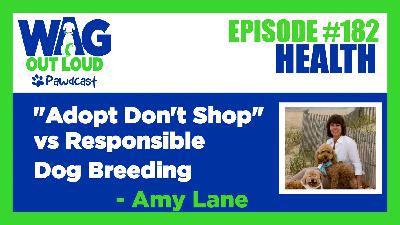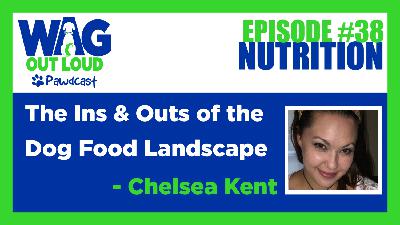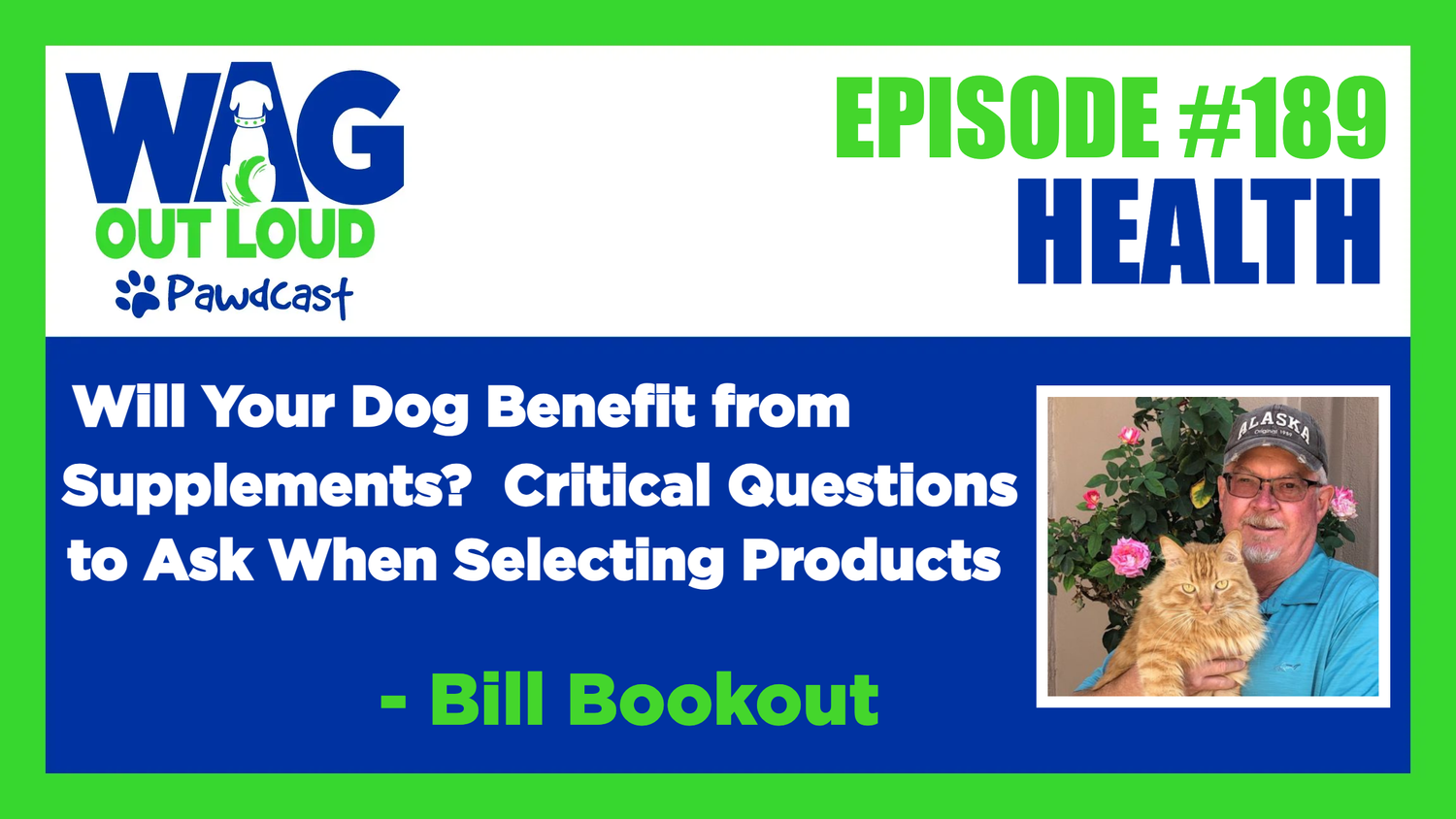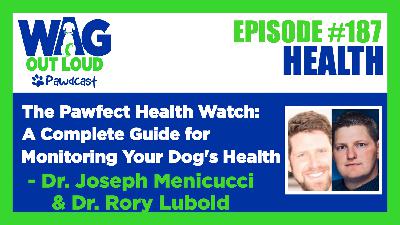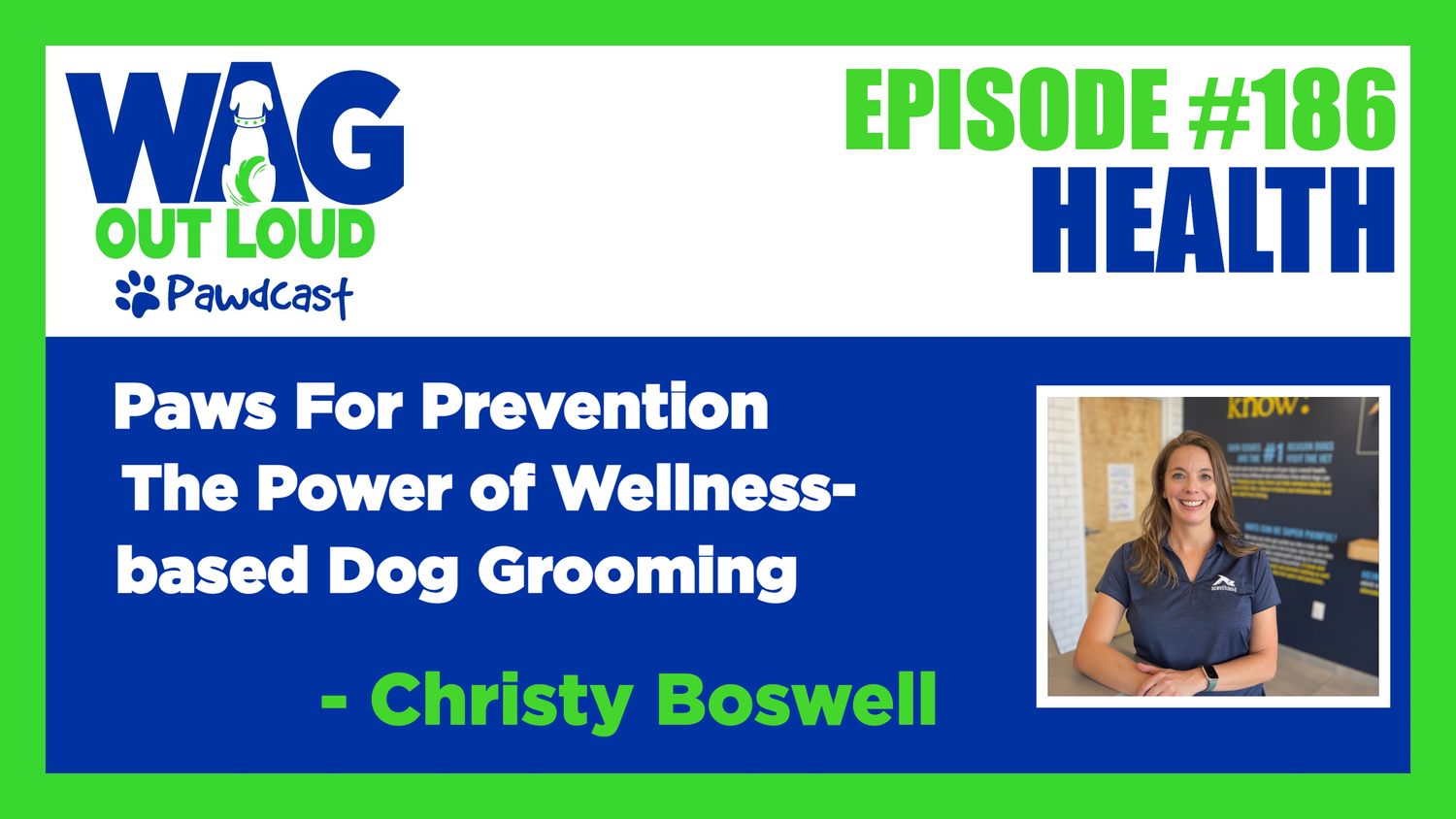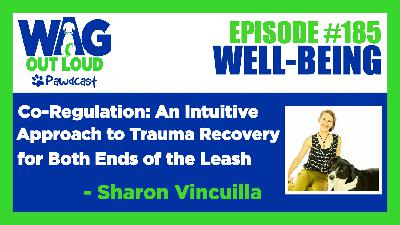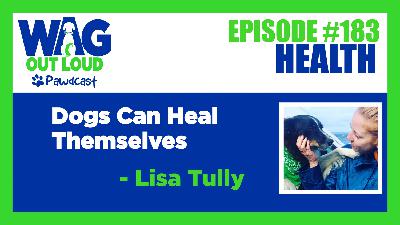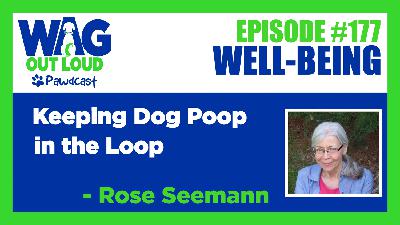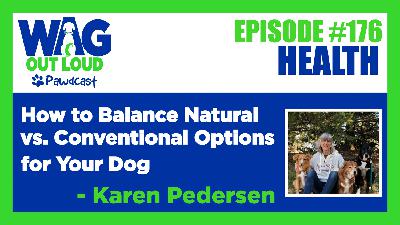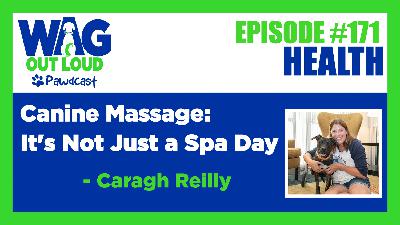“Adopt Don’t Shop” vs. Responsible Dog Breeding
Update: 2023-08-16
Description
Hi everyone, this is Krista with Episode #182 on the Wag Out Loud pawdcast. In the latest Association for the Prevention of Pet Obesity survey, veterinary professionals classified 59% of evaluated dogs as overweight or obese and those numbers are increasing. An easy way for you to gauge your dog's body condition is to just check out the body condition score infographic on the Association for Prevention of Pet Obesity website.
Welcome to the Wag Out Loud pawdcast, where we are obsessed with bringing you helpful tips on canine health care, nutrition, and overall wellbeing. If you'd like to support the show, check out the amazing online events, products and resources that I personally recommend on the Wag Out Loud website. I'm your host, Krista and I'm super excited to be bringing you yet another tail wagging episode.
Hello dog lovers, I am so glad that you've tuned in for today's informative episode, we're going to be talking about adopt don't shop versus responsible dog breeding. And I am joined by Amy lane. And this is a discussion that really needs to happen. I've been looking forward to this. So Amy, thanks so much for being with me today.
It's pleasure to be here. Thanks for having me.
Amy Lane has been breeding dogs for more than 25 years and is the creator of the mini Goldendoodle. She founded the Goldendoodle Association of North America (GANA) to promote and guide the development of the Goldendoodle to achieve breed standards, while maintaining optimum health.
Well, I am excited. Could you please first introduce yourself and tell us why did you want to cover this topic today?
Okay, well, as you stated I am Amy Lane. I am a long longtime dog breeder, and I think that the topic of adopt don't shop doesn't cover things that people really need to know. I'd like to give some comparisons to that versus puppy mills versus a responsible breeder.
Yes. And that's what we're going to cover today. And do you agree me that when it comes to dog ownership, to me, there seems to be two distinct camps. So people either believe in rescuing dogs, and then the others prefer to buy a dog from a breeder. So it's really an individual choice. And I don't think we should shame others for how they're acquiring their dog. Do you agree?
Absolutely. Like I said, I've been breeding dogs for a couple of decades. And both of my children have two rescue dogs. They do not have or don't don't buy dogs or get dogs from me. They want dogs in need, so they're you know, that is something that does need to be addressed. But people that buy from a breeder should not be shamed because there are specific reasons why people seek out a breeder.
Yes. So why don't we unpack this in your mind? What does responsible breeding actually mean?
WHAT IS RESPONSIBLE BREEDING?
Okay, well, every breed of dog out there comes with its own list of diseases and genetic deficiencies. And so from a breeder’s perspective, it's our job to do the appropriate health testing on every prospective breeding dog and weed out those that should not reproduce, and then pair dogs responsibly, to avoid creating litters that have health issues that could be avoided simply by doing health testing.
And with most breeds, you know, AKC recognized breeds and breeders Is there any checks and balances to make sure breeders are breeding correctly, that they do have a really good breeding program?
DOES AKC REGULATE BREEDING PROGRAMS?
Not through the AKC. The AKC basically is a registry. They only allow purebred dogs to be registered their offspring to be registered, but they don't have any input into whether or not the puppies were a result of breeding a brother and a sister, or a mother and a son or a father and a daughter. They have no control over whether the two dogs that were paired together are unhealthy, or have produced previous litters with unhealthy puppies. And so again, that’s just makes them a registry, which is very different from what I think a kennel club should be. I'm involved with GANA, the Golden Doodle Association of North America, which is the kennel club for Golden Doodles And I created this organization back in 2008, to help guide the development of the golden doodle, and to do that in with the best health in mind, as well as temperament. So we have several different rules and regulations in place that are very, very different than the AKC. No dog can be registered as a breeding dog that has produced puppies, but hasn't been health tested, and proven to be worthy of reproducing. And that's our first step into creating healthy offspring purposely.
Right. And I have to commend you for that. Because I know personally, you know, most of my listeners know that we lost Winston back in January. And, you know, he was a Norwich Terrier. I love the Norwich Terrier breed, I knew I wanted another one. And because they're so rare, and I'm super picky about the breeder that I choose, I thought I'd be on a waiting list for at least a year or two. We got Dutton he is a Norwich, he is amazing. And I am so blessed that we got him as soon as we did. But I was very surprised at how few, quote unquote, reputable readers there actually are. I went right to the Norwich Club of America, Judy is the executive director. And I said, Judy, who do you recommend, and she actually wanted to talk me out of the breed, because there aren't many good breeders doing the testing. So I was really disappointed that this breed that I love, that there are so few breeders to choose from. So in your mind, what percentage would you say are good golden doodle breeders, since that's the breed that you work with?
That would be a number very difficult to ascertain simply because unless they are a breeder that is visible, such as being a member of GANA, we don't necessarily know about them. And I noticed there are breeders out there that are not members GANA, that aren't good breeders that are doing the health testing. But the numbers of breeders that aren't doing the health testing, and are only doing this to gain, you know, a few extra bucks, way way, outweigh the number of good breeders. And that was one of my purposes with GANA was to raise awareness about health testing and the importance of it. And the simple fact that we could avoid creating litters of puppies with known health issues that could easily be avoided with appropriate testing. Because a lot of times, that's the type of puppy that ends up in a shelter, because they've got issues and no one wants to adopt them and you can't sell them. And full litters many times are dropped off at shelters. And that that's a very sad situation that we all need to work together to raise awareness.
Yes. And what do you think it is? Amy? Is it? I hate to say it is that the money that some of these breeders are just overlooking health issues that they know are there, but continue to breed that dog or those dogs?
WHAT MAKES AN UNREPUTABLE BREEDER?
I think it's a combination of money and or ignorance. With without the appropriate education, how is that uneducated breeder going to know to do better? So that that's, you know, one issue. The other is, it's an expensive task to raise breeding dogs and weed out the ones that don't pass something, we put our dogs to so many different tests and if they failed one single one, then they're removed from my breeding program. They are spayed or neutered and they're a pet for the rest of their life. So when you've got a breeder who owns tow or three dogs they've raised and two of them don't pass something rather than start over, they just breed those dogs. And so that that then does come down to money. And that's why the consumer needs to be so aware and and make sure the proper health testing is being done on the parent dogs.
And Amy when we talk about health testing, what are we testing for?
WHAT’S INVOLVED IN HEALTH TESTING?
Well for each breed. It's different, different there has to be testing for the issues that are prevalent in that particular breed. So for golden doodles, we have to test for anything that is prevalent with the golden retriever and also the poodle, because a golden doodle can have any of those issues. So we for say a blue ribbon designation was GANA, we require that both parent dogs be tested and have passion rating for hip, heart, eyes, elbows at the patellas. And then we also have a list of diseases that are prevalent in one or the other poodle, or golden retriever breeds. And so, the diseases that we are testing for now and these diseases, change from time to time, as they become more prevalent, or as labs discover new diseases that they can actually test for. So the diseases we test for are ichthyosis, which comes from the golden retriever, Von Willebrand Disease which comes from the poodle, degenerative myelopathy, which can come from both. We have three different mutations of progressive retinal atrophy. One is a poodle mutation, two are golden retriever mutations. And we test for neonatal encephalitis, that's a poodle issue. And not that GANA is requiring these other two diseases, but it is something that I've been concentrating on which is Chondrodystrophy and Chondrodysplasia, which are the genes responsible for shorter legs in dogs, like Corgis and Dachshunds. Which are endearing for their breed, but undesirable in my breed.
Sure. And do you test the mom and dad before each breeding? Or is it once a year? What does that look like?
Well, the DNA testing needs to be done only once. So whatever the results are, we know that that we can breed a dog that is a carrier of something, but we just can't pair it with another dog that carries that same mutation. Because carriers are safe to breed, but two carriers that have the same mutation, then you have a chance of those those being paired up and when puppies inherit two of the same disease mutations, then they're affected with that disease. So DNA done once. And many times we don't even have to test puppies, because if we've t
Welcome to the Wag Out Loud pawdcast, where we are obsessed with bringing you helpful tips on canine health care, nutrition, and overall wellbeing. If you'd like to support the show, check out the amazing online events, products and resources that I personally recommend on the Wag Out Loud website. I'm your host, Krista and I'm super excited to be bringing you yet another tail wagging episode.
Hello dog lovers, I am so glad that you've tuned in for today's informative episode, we're going to be talking about adopt don't shop versus responsible dog breeding. And I am joined by Amy lane. And this is a discussion that really needs to happen. I've been looking forward to this. So Amy, thanks so much for being with me today.
It's pleasure to be here. Thanks for having me.
Amy Lane has been breeding dogs for more than 25 years and is the creator of the mini Goldendoodle. She founded the Goldendoodle Association of North America (GANA) to promote and guide the development of the Goldendoodle to achieve breed standards, while maintaining optimum health.
Well, I am excited. Could you please first introduce yourself and tell us why did you want to cover this topic today?
Okay, well, as you stated I am Amy Lane. I am a long longtime dog breeder, and I think that the topic of adopt don't shop doesn't cover things that people really need to know. I'd like to give some comparisons to that versus puppy mills versus a responsible breeder.
Yes. And that's what we're going to cover today. And do you agree me that when it comes to dog ownership, to me, there seems to be two distinct camps. So people either believe in rescuing dogs, and then the others prefer to buy a dog from a breeder. So it's really an individual choice. And I don't think we should shame others for how they're acquiring their dog. Do you agree?
Absolutely. Like I said, I've been breeding dogs for a couple of decades. And both of my children have two rescue dogs. They do not have or don't don't buy dogs or get dogs from me. They want dogs in need, so they're you know, that is something that does need to be addressed. But people that buy from a breeder should not be shamed because there are specific reasons why people seek out a breeder.
Yes. So why don't we unpack this in your mind? What does responsible breeding actually mean?
WHAT IS RESPONSIBLE BREEDING?
Okay, well, every breed of dog out there comes with its own list of diseases and genetic deficiencies. And so from a breeder’s perspective, it's our job to do the appropriate health testing on every prospective breeding dog and weed out those that should not reproduce, and then pair dogs responsibly, to avoid creating litters that have health issues that could be avoided simply by doing health testing.
And with most breeds, you know, AKC recognized breeds and breeders Is there any checks and balances to make sure breeders are breeding correctly, that they do have a really good breeding program?
DOES AKC REGULATE BREEDING PROGRAMS?
Not through the AKC. The AKC basically is a registry. They only allow purebred dogs to be registered their offspring to be registered, but they don't have any input into whether or not the puppies were a result of breeding a brother and a sister, or a mother and a son or a father and a daughter. They have no control over whether the two dogs that were paired together are unhealthy, or have produced previous litters with unhealthy puppies. And so again, that’s just makes them a registry, which is very different from what I think a kennel club should be. I'm involved with GANA, the Golden Doodle Association of North America, which is the kennel club for Golden Doodles And I created this organization back in 2008, to help guide the development of the golden doodle, and to do that in with the best health in mind, as well as temperament. So we have several different rules and regulations in place that are very, very different than the AKC. No dog can be registered as a breeding dog that has produced puppies, but hasn't been health tested, and proven to be worthy of reproducing. And that's our first step into creating healthy offspring purposely.
Right. And I have to commend you for that. Because I know personally, you know, most of my listeners know that we lost Winston back in January. And, you know, he was a Norwich Terrier. I love the Norwich Terrier breed, I knew I wanted another one. And because they're so rare, and I'm super picky about the breeder that I choose, I thought I'd be on a waiting list for at least a year or two. We got Dutton he is a Norwich, he is amazing. And I am so blessed that we got him as soon as we did. But I was very surprised at how few, quote unquote, reputable readers there actually are. I went right to the Norwich Club of America, Judy is the executive director. And I said, Judy, who do you recommend, and she actually wanted to talk me out of the breed, because there aren't many good breeders doing the testing. So I was really disappointed that this breed that I love, that there are so few breeders to choose from. So in your mind, what percentage would you say are good golden doodle breeders, since that's the breed that you work with?
That would be a number very difficult to ascertain simply because unless they are a breeder that is visible, such as being a member of GANA, we don't necessarily know about them. And I noticed there are breeders out there that are not members GANA, that aren't good breeders that are doing the health testing. But the numbers of breeders that aren't doing the health testing, and are only doing this to gain, you know, a few extra bucks, way way, outweigh the number of good breeders. And that was one of my purposes with GANA was to raise awareness about health testing and the importance of it. And the simple fact that we could avoid creating litters of puppies with known health issues that could easily be avoided with appropriate testing. Because a lot of times, that's the type of puppy that ends up in a shelter, because they've got issues and no one wants to adopt them and you can't sell them. And full litters many times are dropped off at shelters. And that that's a very sad situation that we all need to work together to raise awareness.
Yes. And what do you think it is? Amy? Is it? I hate to say it is that the money that some of these breeders are just overlooking health issues that they know are there, but continue to breed that dog or those dogs?
WHAT MAKES AN UNREPUTABLE BREEDER?
I think it's a combination of money and or ignorance. With without the appropriate education, how is that uneducated breeder going to know to do better? So that that's, you know, one issue. The other is, it's an expensive task to raise breeding dogs and weed out the ones that don't pass something, we put our dogs to so many different tests and if they failed one single one, then they're removed from my breeding program. They are spayed or neutered and they're a pet for the rest of their life. So when you've got a breeder who owns tow or three dogs they've raised and two of them don't pass something rather than start over, they just breed those dogs. And so that that then does come down to money. And that's why the consumer needs to be so aware and and make sure the proper health testing is being done on the parent dogs.
And Amy when we talk about health testing, what are we testing for?
WHAT’S INVOLVED IN HEALTH TESTING?
Well for each breed. It's different, different there has to be testing for the issues that are prevalent in that particular breed. So for golden doodles, we have to test for anything that is prevalent with the golden retriever and also the poodle, because a golden doodle can have any of those issues. So we for say a blue ribbon designation was GANA, we require that both parent dogs be tested and have passion rating for hip, heart, eyes, elbows at the patellas. And then we also have a list of diseases that are prevalent in one or the other poodle, or golden retriever breeds. And so, the diseases that we are testing for now and these diseases, change from time to time, as they become more prevalent, or as labs discover new diseases that they can actually test for. So the diseases we test for are ichthyosis, which comes from the golden retriever, Von Willebrand Disease which comes from the poodle, degenerative myelopathy, which can come from both. We have three different mutations of progressive retinal atrophy. One is a poodle mutation, two are golden retriever mutations. And we test for neonatal encephalitis, that's a poodle issue. And not that GANA is requiring these other two diseases, but it is something that I've been concentrating on which is Chondrodystrophy and Chondrodysplasia, which are the genes responsible for shorter legs in dogs, like Corgis and Dachshunds. Which are endearing for their breed, but undesirable in my breed.
Sure. And do you test the mom and dad before each breeding? Or is it once a year? What does that look like?
Well, the DNA testing needs to be done only once. So whatever the results are, we know that that we can breed a dog that is a carrier of something, but we just can't pair it with another dog that carries that same mutation. Because carriers are safe to breed, but two carriers that have the same mutation, then you have a chance of those those being paired up and when puppies inherit two of the same disease mutations, then they're affected with that disease. So DNA done once. And many times we don't even have to test puppies, because if we've t
Comments
In Channel

